It is said that with age comes wisdom. Such is the case with Doble Engineering Company’s annual Client Conference, which celebrated its 70th consecutive year in April. The Doble Client Conference has developed over the years, from a small gathering of twenty engineers discussing power factor testing, to what it is today – hundreds of electric industry professionals from utilities, testing companies, manufacturing plants and related businesses worldwide, reviewing recent practice for the much broader aspects of maintenance engineering activities.
350 companies from 25 countries sent representatives to Doble’s 2003 event. They came to take advantage of the unique aspect of the Doble Conference – the fact that it continues to be designed by and for the needs of those that purchase, test, and maintain electric apparatus and protection. The agenda included over 80 technical presentations, 11 tutorials, 12 committee meetings, 2 user group meetings, and a trade show, not to mention a few social events! Attendees came for the opportunity to exchange information and knowledge, to share their experiences with others and learn from their colleagues the latest maintenance findings and practices. Together, these delegates are charting the course for continued research and development in the electric power industry. As talented engineers change positions or retire, new individuals take their place, and the collective knowledge needs to be passed on. The attendees at Doble’s Client Conference place a very high value on the experience, and put their new information to practical use when they return to their jobs.
The 2003 Doble Client Conference was kicked off with a keynote address by Bruce Blakeman, U.S. Department of Commerce, on the state of the current electrical power industry. Major themes at this year’s Conference included Asset and Maintenance Management, Substation Engineering, Power Plant Design and Distribution Engineering.
The Asset and Maintenance Management session was introduced to the Doble Conference in 2002. This addition was prompted by Doble’s recommendation that this new trend would be of benefit to the client group and needed to be addressed. The practice of asset management is advancing quickly in some countries and is beginning to develop in the U.S. As proof of this, some Doble Conference attendees who were formally Transformer Maintenance Engineers are now attending the Conference in the role of Asset Managers.
A special session covering the management of asset performance in the current utility business was given by industry leaders on the first day of the 2003 Doble Conference. Presenters included Barry Worthington, U.S. Energy Association, Stephen Lewis, National Grid USA, David Mohre, National Rural Electric Cooperative Association, and James Connelly of the Massachusetts Dept. of Telecommunications and Energy. The session focused on whether a clear vision could be found that would ensure an effective open market - one that would lower costs to the nations’ industries, creating an effective level of system integrity and maintaining investors in the utility sector. The implications for those responsible for managing and maintaining the asset base of all utilities was also covered. The discussion continued with a variety of presentations on asset management experiences from around the world.
The Conference program continued throughout the week with the main sessions, consisting of technical presentations organized by the different Doble Client Committees.
In the Asset and Maintenance Management session, there were three major themes.
In the first, presenters from New Zealand, UK and Canada described their experiences introducing an integrated approach to the management of electric apparatus. They described the significant gains and the accompanying pain from the associated cultural changes within their companies. The second theme covered the techniques used to cost justify either asset replacement/ investment, with a particularly useful presentation from the Czech Republic. The third theme looked at methods to assess the effectiveness of maintenance strategies, and included discussion of key performance indicators, benchmarking and using operational performance statistics to focus operating expenditure. The Asset and Maintenance Management Committee sponsored two different tutorials at the Conference. In the first, Carl Manger and Joseph Reynolds of FTI presented "The Engineer in Court", which provided advice for engineers involved in giving expert witness testimony. In the second of the committee’s tutorials “Managing Safety in the USA”, Jim White of Shermco gave a very comprehensive description of the requirements for complying with OSHA safety legislation.
The Transformer session continued to hold its position of popularity, and included presentations on condition assessment of transformers, general maintenance activities and advanced testing methods. The maintenance engineers and test technicians attending this session gained information concerning on-line conditioning, preservation systems, phase shifter testing and welding of oil filled tanks. The advanced transformer testing included discussions about sweep frequency analysis and leakage reactance.
The Bushings, Insulators and Instrument Transformers session was also very well attended. It included presentations on oil leak problems, bushing failures that occurred in the field, and investigations of bushing failures. A report was provided on the development of methods for predicting current transformer failures. In addition, revisions of the IEEE Standard C57.19.01 (Standard Performance Characteristics and Dimensions for Outdoor Apparatus Bushings) were discussed in detail, and the effects it would have on the power industry. There was a lengthy discussion of C2 power factor and capacitance measurements on low voltage bushings. The latest advancements in bushing technology were shared, such as the development of polymer sight bowls for bushings and the use of polymer for condenser bushings in lieu of porcelain weathersheds.
The Doble Insulating Materials session included an eclectic but extremely interesting range of topics. The first paper focused on an alternative method for accelerated oxidation of synthetic and vegetable-based insulating oils. Presentations on diagnostics for load tap changers and oil circuit breakers using laboratory analysis provided information on some of the most current and provocative research being conducted in these areas. Since the Insulating Materials committee has expanded to include solid dielectrics as well as liquid dielectrics, there was a timely presentation on the factors that affect the dielectric strength of solid insulation such as Kraft paper, providing an in-depth look at aging, water and contamination as factors. A new concept in SF6 contamination detection by the use of ion mobility spectrometry was provided. A presentation on a new acetylene sensor for transformer oil that is presently being field tested not only provided relevant information on the sensor itself, but the formation of gases from an incipient-fault condition. With Shell Global Solutions, Inc.U.S. refineries leaving the marketplace as a supplier of transformer oil, a representative for Shell products presented information on the situation as part of the Insulating Materials session. Following the session, a tutorial was given by Doble on “Insulating Mineral Oils.” It covered many aspects of oil manufacture, specifications for electrical insulating mineral oils, typical properties of oils, transportation, testing of new oils and oils received in new equipment, inservice criteria for oil quality and case studies about in-service transformers.
For those Doble clients with an even greater interest in Oils, Doble also has a private Oil Committee that they can join. At this year’s Conference, the Oil Committee met and continued the Insulating Material session’s discussion on the topic of Shell Global Solutions, Inc. U.S. leaving the marketplace. Transformer oil purchasers are looking for alternative sources for good quality product for the last quarter of this year when supply may be short of demand. The Oil Committee sponsors the annual Doble Oil Survey, which provides the results of specification tests for many electrical insulating oils produced and sold worldwide. The tests included in this report include all those outlined in the Doble Transformer Oil Purchase Specification and the ASTM D 3487 specification for new transformer oil. In light of the challenge facing transformer oil purchasers this year, the Doble Oil Survey findings should be a very valuable tool. The Oil Committee has also just developed a research report on the gassing characteristics on new oils under moderate thermal and oxidation conditions that revealed significant differences in the behavior of commercial products.
In the Circuit Breaker session, utility representatives exchanged valuable information on several subjects. In the area of safety, fall protection for employees working on high voltage large oil circuit breakers was discussed, with several important solutions presented. From an environmental point of view, the handling of SF6 gas cylinders, and of SF6 gas in general was debated. One client explained a serious safety problem developing after the repair/refurbishment of some older circuit breakers and how it was resolved. There were six presentations relating to problems with several types of new circuit breakers, along with manufacturer’s service advisories and proposed solutions. Eleven other situations were presented regarding older breakers, breaker bushings, reclosers, and general switchgear. Training is an important aspect of this committee’s work – they sponsored two highly successful tutorials on Circuit Breakers, presented by an expert in the field, David Peelo. These tutorials explained the arc extinction processes in circuit breakers and gave the attendees a greater appreciation of the maintenance requirements for circuit breakers.
In the Rotating Machinery session, a great deal of interest and discussion was generated around the topic of Life Cycle Management. Two presentations were offered in this area. The first discussed the upgrade of four hydroelectric motor-generators where the greatest change occurred in the cooling system. The stator cores are cooled by raw water heat exchanging stainless steel tubes recessed into the back of the stator core. The second discussed how an in-service failure resulted in not only a repair, but also an upgrade in capacity by 2 to 4 MVA (depending on cooling water conditions). The upgrade permitted a 25 degrees C increase in safe operating temperature and the use of Roebel bars helped reduce winding losses by 5 kW.
Discussion of problems with distribution class equipment was sponsored by the Arresters, Capacitors, Cables and Accessories Committee. Two papers reviewed the performance of transformers at 69kV and below with transmission class units. Failure, electrical and oil test data are surprisingly similar. The Doble Knowledgebase was used to examine failure modes and test data, and illustrated with a detailed study of National Grid USA transformer performance. Failure performance was also covered in a paper from Salt River Project as the topic moved to cables. Detection of defects in cable systems using on and off line partial discharge methods was presented in papers from IMCORP and Pirelli.
One of the most highly valued activities at the Doble Conference continues to be the private Client Committee meetings. Unlike the Conference sessions, which also run throughout the week and are open to manufacturers and insurers, the Client Committee Meetings are for utilities and testing companies only, which allows to discuss their needs and issues openly. At the April Committee meetings, a number of new projects were discussed. The Transformers Committee reported on the progress of a Large Transformer Specification Guide they are developing. They are also planning a tutorial on transformer cooling, pumps and piping. This year’s Doble technical questionnaires will include the topics of transformer overloading and testing requirements after a through fault. In the Bushings Committee Meeting, the need was expressed for the development of a Bushing Field Troubleshooting Guide. The guide would include all common testing issues, and would provide testers and end users with a reference guide to determine the condition of their bushings. It will provide guidelines for actions to be taken based on test results, and include proper test procedures and connections and explain what to do if data is suspect.
Once developed, these new guides will become part of Doble’s Knowledgebase, and be accessible by the client community.
The 2003 Doble Conference also included an Industry Expo with exhibits from over 60 companies. With so many utility representatives attending the Doble Conference, the event is an excellent opportunity for manufacturers and other companies who wish to show their most recent products. Doble’s utility client attendees find the tradeshow is of great benefit to them as well, as it enables them to meet with vendors throughout the week at their convenience. This was the third year that Doble has offered the Industry Expo, and it continues to be a positive addition, and does not diminish the Conference’s technical nature.
Planning for the 2004 International Conference of Doble Clients has already begun. Next year’s Conference will be taking place March 21-26 at the Westin Copley Place hotel in Boston, MA USA. Doble has already sent out the first Call for Papers announcement for the 2004 Conference, and will be considering submissions from presenters outside of the Doble client group. For more information on submitting an abstract for consideration, go to www.doble.com.
The annual “Fall Meetings” of the Doble Client Committees will be taking place at the Westin Resort in Hilton Head Island, SC, on September 21-26, 2003. This event is open to all Doble clients involved in the electric industry except manufacturers and insurers, and is a more informal networking experience than the April Conference. At the Fall Meetings, there is more time and space for the attendees to share experiences in a way that would not be possible in an open meeting where OEMs, insurers and the like are present. This gathering has been and continues to be one of the key value-added factors for Doble’s client group.
Doble’s ProTest User Group will also hold its annual meeting during the same week in Hilton Head; this co-location was tested in 2002 and was well received by all parties. In addition, Doble will be offering a Laboratory Diagnostics Seminar at the same site on September 26th. For more information about Doble’s events, visit the company web site at www.doble.com.
Note:
The September issue of Electric Energy will include an editorial based on one of the 2003 Doble Conference presentations.
350 companies from 25 countries sent representatives to Doble’s 2003 event. They came to take advantage of the unique aspect of the Doble Conference – the fact that it continues to be designed by and for the needs of those that purchase, test, and maintain electric apparatus and protection. The agenda included over 80 technical presentations, 11 tutorials, 12 committee meetings, 2 user group meetings, and a trade show, not to mention a few social events! Attendees came for the opportunity to exchange information and knowledge, to share their experiences with others and learn from their colleagues the latest maintenance findings and practices. Together, these delegates are charting the course for continued research and development in the electric power industry. As talented engineers change positions or retire, new individuals take their place, and the collective knowledge needs to be passed on. The attendees at Doble’s Client Conference place a very high value on the experience, and put their new information to practical use when they return to their jobs.
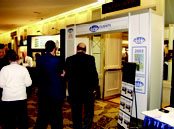
The 2003 Doble Client Conference was kicked off with a keynote address by Bruce Blakeman, U.S. Department of Commerce, on the state of the current electrical power industry. Major themes at this year’s Conference included Asset and Maintenance Management, Substation Engineering, Power Plant Design and Distribution Engineering.
The Asset and Maintenance Management session was introduced to the Doble Conference in 2002. This addition was prompted by Doble’s recommendation that this new trend would be of benefit to the client group and needed to be addressed. The practice of asset management is advancing quickly in some countries and is beginning to develop in the U.S. As proof of this, some Doble Conference attendees who were formally Transformer Maintenance Engineers are now attending the Conference in the role of Asset Managers.
A special session covering the management of asset performance in the current utility business was given by industry leaders on the first day of the 2003 Doble Conference. Presenters included Barry Worthington, U.S. Energy Association, Stephen Lewis, National Grid USA, David Mohre, National Rural Electric Cooperative Association, and James Connelly of the Massachusetts Dept. of Telecommunications and Energy. The session focused on whether a clear vision could be found that would ensure an effective open market - one that would lower costs to the nations’ industries, creating an effective level of system integrity and maintaining investors in the utility sector. The implications for those responsible for managing and maintaining the asset base of all utilities was also covered. The discussion continued with a variety of presentations on asset management experiences from around the world.
The Conference program continued throughout the week with the main sessions, consisting of technical presentations organized by the different Doble Client Committees.
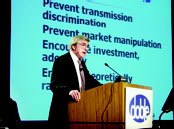
In the Asset and Maintenance Management session, there were three major themes.
In the first, presenters from New Zealand, UK and Canada described their experiences introducing an integrated approach to the management of electric apparatus. They described the significant gains and the accompanying pain from the associated cultural changes within their companies. The second theme covered the techniques used to cost justify either asset replacement/ investment, with a particularly useful presentation from the Czech Republic. The third theme looked at methods to assess the effectiveness of maintenance strategies, and included discussion of key performance indicators, benchmarking and using operational performance statistics to focus operating expenditure. The Asset and Maintenance Management Committee sponsored two different tutorials at the Conference. In the first, Carl Manger and Joseph Reynolds of FTI presented "The Engineer in Court", which provided advice for engineers involved in giving expert witness testimony. In the second of the committee’s tutorials “Managing Safety in the USA”, Jim White of Shermco gave a very comprehensive description of the requirements for complying with OSHA safety legislation.
The Transformer session continued to hold its position of popularity, and included presentations on condition assessment of transformers, general maintenance activities and advanced testing methods. The maintenance engineers and test technicians attending this session gained information concerning on-line conditioning, preservation systems, phase shifter testing and welding of oil filled tanks. The advanced transformer testing included discussions about sweep frequency analysis and leakage reactance.
The Bushings, Insulators and Instrument Transformers session was also very well attended. It included presentations on oil leak problems, bushing failures that occurred in the field, and investigations of bushing failures. A report was provided on the development of methods for predicting current transformer failures. In addition, revisions of the IEEE Standard C57.19.01 (Standard Performance Characteristics and Dimensions for Outdoor Apparatus Bushings) were discussed in detail, and the effects it would have on the power industry. There was a lengthy discussion of C2 power factor and capacitance measurements on low voltage bushings. The latest advancements in bushing technology were shared, such as the development of polymer sight bowls for bushings and the use of polymer for condenser bushings in lieu of porcelain weathersheds.
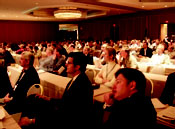
The Doble Insulating Materials session included an eclectic but extremely interesting range of topics. The first paper focused on an alternative method for accelerated oxidation of synthetic and vegetable-based insulating oils. Presentations on diagnostics for load tap changers and oil circuit breakers using laboratory analysis provided information on some of the most current and provocative research being conducted in these areas. Since the Insulating Materials committee has expanded to include solid dielectrics as well as liquid dielectrics, there was a timely presentation on the factors that affect the dielectric strength of solid insulation such as Kraft paper, providing an in-depth look at aging, water and contamination as factors. A new concept in SF6 contamination detection by the use of ion mobility spectrometry was provided. A presentation on a new acetylene sensor for transformer oil that is presently being field tested not only provided relevant information on the sensor itself, but the formation of gases from an incipient-fault condition. With Shell Global Solutions, Inc.U.S. refineries leaving the marketplace as a supplier of transformer oil, a representative for Shell products presented information on the situation as part of the Insulating Materials session. Following the session, a tutorial was given by Doble on “Insulating Mineral Oils.” It covered many aspects of oil manufacture, specifications for electrical insulating mineral oils, typical properties of oils, transportation, testing of new oils and oils received in new equipment, inservice criteria for oil quality and case studies about in-service transformers.
For those Doble clients with an even greater interest in Oils, Doble also has a private Oil Committee that they can join. At this year’s Conference, the Oil Committee met and continued the Insulating Material session’s discussion on the topic of Shell Global Solutions, Inc. U.S. leaving the marketplace. Transformer oil purchasers are looking for alternative sources for good quality product for the last quarter of this year when supply may be short of demand. The Oil Committee sponsors the annual Doble Oil Survey, which provides the results of specification tests for many electrical insulating oils produced and sold worldwide. The tests included in this report include all those outlined in the Doble Transformer Oil Purchase Specification and the ASTM D 3487 specification for new transformer oil. In light of the challenge facing transformer oil purchasers this year, the Doble Oil Survey findings should be a very valuable tool. The Oil Committee has also just developed a research report on the gassing characteristics on new oils under moderate thermal and oxidation conditions that revealed significant differences in the behavior of commercial products.
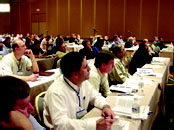
In the Circuit Breaker session, utility representatives exchanged valuable information on several subjects. In the area of safety, fall protection for employees working on high voltage large oil circuit breakers was discussed, with several important solutions presented. From an environmental point of view, the handling of SF6 gas cylinders, and of SF6 gas in general was debated. One client explained a serious safety problem developing after the repair/refurbishment of some older circuit breakers and how it was resolved. There were six presentations relating to problems with several types of new circuit breakers, along with manufacturer’s service advisories and proposed solutions. Eleven other situations were presented regarding older breakers, breaker bushings, reclosers, and general switchgear. Training is an important aspect of this committee’s work – they sponsored two highly successful tutorials on Circuit Breakers, presented by an expert in the field, David Peelo. These tutorials explained the arc extinction processes in circuit breakers and gave the attendees a greater appreciation of the maintenance requirements for circuit breakers.
In the Rotating Machinery session, a great deal of interest and discussion was generated around the topic of Life Cycle Management. Two presentations were offered in this area. The first discussed the upgrade of four hydroelectric motor-generators where the greatest change occurred in the cooling system. The stator cores are cooled by raw water heat exchanging stainless steel tubes recessed into the back of the stator core. The second discussed how an in-service failure resulted in not only a repair, but also an upgrade in capacity by 2 to 4 MVA (depending on cooling water conditions). The upgrade permitted a 25 degrees C increase in safe operating temperature and the use of Roebel bars helped reduce winding losses by 5 kW.
Discussion of problems with distribution class equipment was sponsored by the Arresters, Capacitors, Cables and Accessories Committee. Two papers reviewed the performance of transformers at 69kV and below with transmission class units. Failure, electrical and oil test data are surprisingly similar. The Doble Knowledgebase was used to examine failure modes and test data, and illustrated with a detailed study of National Grid USA transformer performance. Failure performance was also covered in a paper from Salt River Project as the topic moved to cables. Detection of defects in cable systems using on and off line partial discharge methods was presented in papers from IMCORP and Pirelli.
One of the most highly valued activities at the Doble Conference continues to be the private Client Committee meetings. Unlike the Conference sessions, which also run throughout the week and are open to manufacturers and insurers, the Client Committee Meetings are for utilities and testing companies only, which allows to discuss their needs and issues openly. At the April Committee meetings, a number of new projects were discussed. The Transformers Committee reported on the progress of a Large Transformer Specification Guide they are developing. They are also planning a tutorial on transformer cooling, pumps and piping. This year’s Doble technical questionnaires will include the topics of transformer overloading and testing requirements after a through fault. In the Bushings Committee Meeting, the need was expressed for the development of a Bushing Field Troubleshooting Guide. The guide would include all common testing issues, and would provide testers and end users with a reference guide to determine the condition of their bushings. It will provide guidelines for actions to be taken based on test results, and include proper test procedures and connections and explain what to do if data is suspect.
Once developed, these new guides will become part of Doble’s Knowledgebase, and be accessible by the client community.
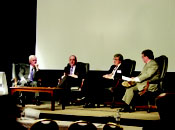
The 2003 Doble Conference also included an Industry Expo with exhibits from over 60 companies. With so many utility representatives attending the Doble Conference, the event is an excellent opportunity for manufacturers and other companies who wish to show their most recent products. Doble’s utility client attendees find the tradeshow is of great benefit to them as well, as it enables them to meet with vendors throughout the week at their convenience. This was the third year that Doble has offered the Industry Expo, and it continues to be a positive addition, and does not diminish the Conference’s technical nature.
Planning for the 2004 International Conference of Doble Clients has already begun. Next year’s Conference will be taking place March 21-26 at the Westin Copley Place hotel in Boston, MA USA. Doble has already sent out the first Call for Papers announcement for the 2004 Conference, and will be considering submissions from presenters outside of the Doble client group. For more information on submitting an abstract for consideration, go to www.doble.com.
The annual “Fall Meetings” of the Doble Client Committees will be taking place at the Westin Resort in Hilton Head Island, SC, on September 21-26, 2003. This event is open to all Doble clients involved in the electric industry except manufacturers and insurers, and is a more informal networking experience than the April Conference. At the Fall Meetings, there is more time and space for the attendees to share experiences in a way that would not be possible in an open meeting where OEMs, insurers and the like are present. This gathering has been and continues to be one of the key value-added factors for Doble’s client group.
Doble’s ProTest User Group will also hold its annual meeting during the same week in Hilton Head; this co-location was tested in 2002 and was well received by all parties. In addition, Doble will be offering a Laboratory Diagnostics Seminar at the same site on September 26th. For more information about Doble’s events, visit the company web site at www.doble.com.
Note:
The September issue of Electric Energy will include an editorial based on one of the 2003 Doble Conference presentations.







